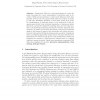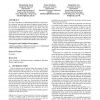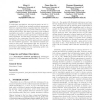1416 search results - page 249 / 284 » Designing creative artificial systems |
ARGMAS
2009
Springer
14 years 2 months ago
2009
Springer
Abstract. A framework, PISA, for conducting dialogues to resolve disputes concerning the correct categorisation of particular cases, is described. Unlike previous systems to conduc...
ATAL
2009
Springer
14 years 2 months ago
2009
Springer
In a team competition, two participating teams have an equal number of players, and each team orders its players linearly based on their strengths. A mechanism then specifies how...
ATAL
2009
Springer
14 years 2 months ago
2009
Springer
In multi-issue negotiations, autonomous agents can act cooperatively to benefit from mutually preferred agreements. However, empirical evidence suggests that they often fail to s...
GECCO
2009
Springer
14 years 2 months ago
2009
Springer
Evolution has proven to be an effective method of training heterogeneous multi-agent teams of autonomous agents to explore unknown environments. Autonomous, heterogeneous agents ...
GECCO
2009
Springer
14 years 2 months ago
2009
Springer
We describe a methodology for evolving Java bytecode, enabling the evolution of extant, unrestricted Java programs, or programs in other languages that compile to Java bytecode. B...



